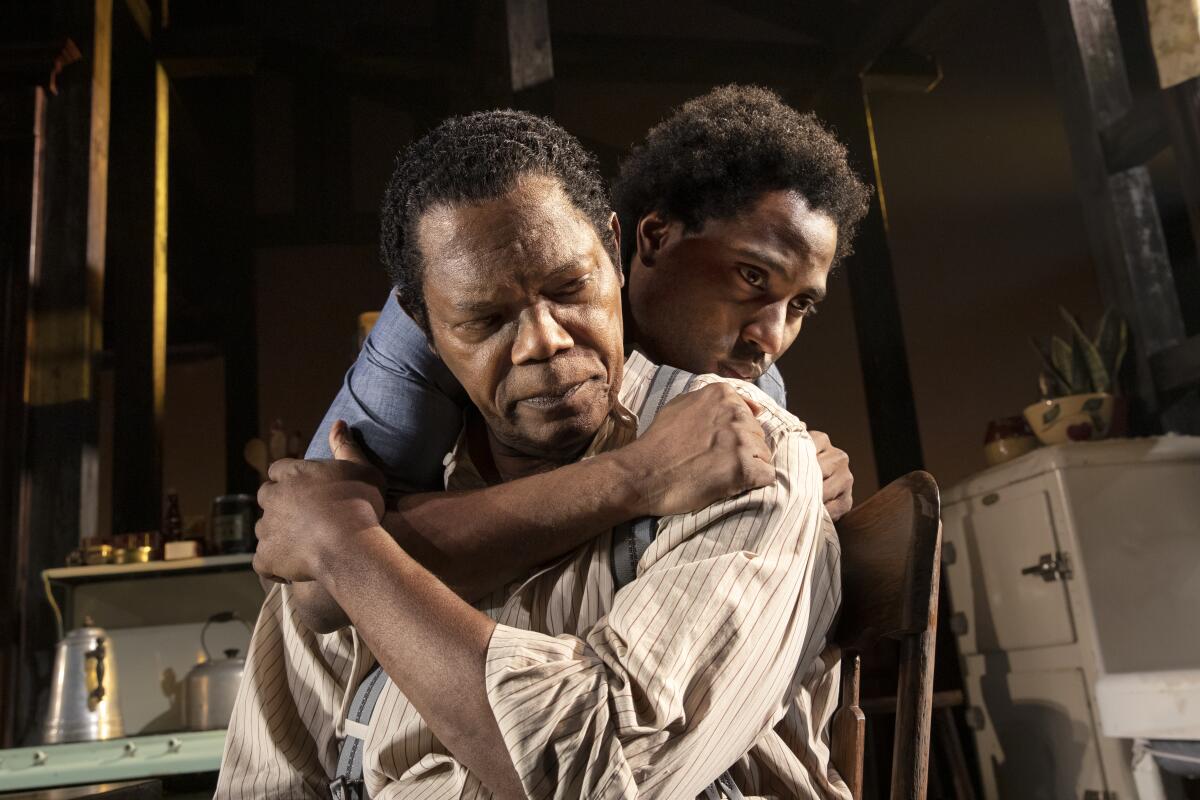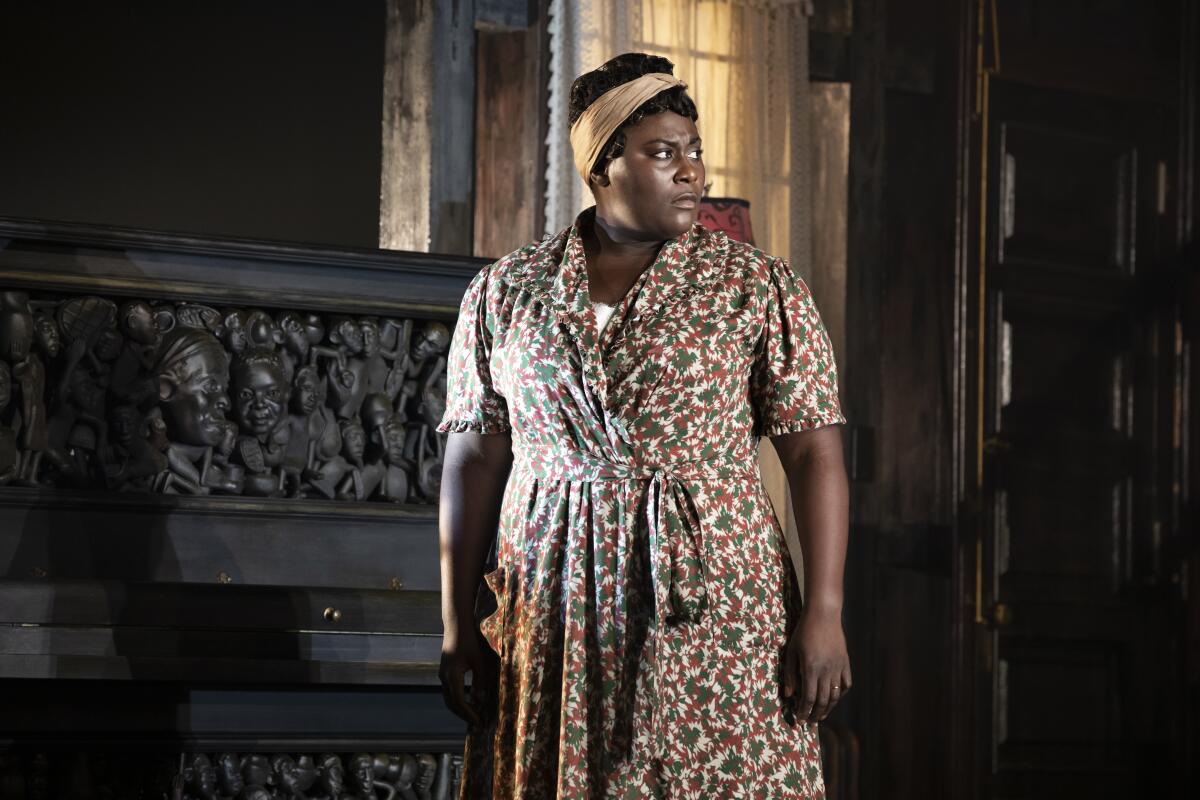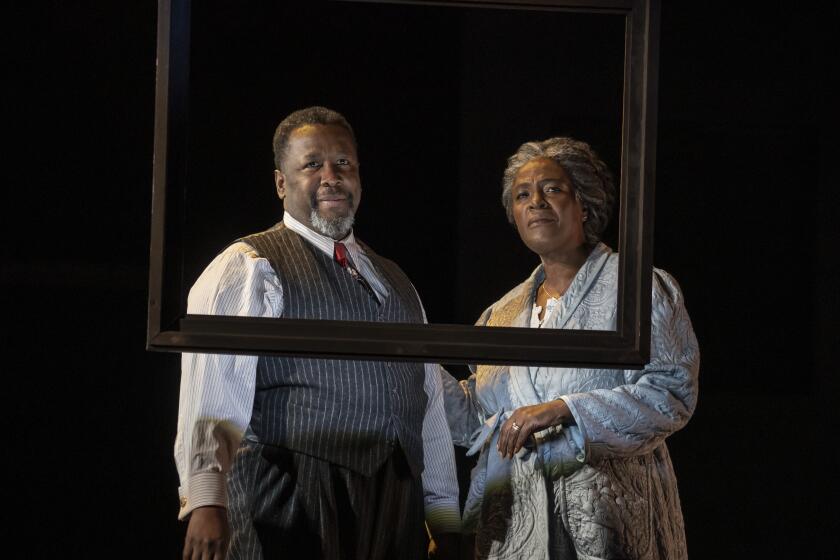Review: Samuel L. Jackson stars in a not-always-in-tune Broadway revival of ‘The Piano Lesson’

- Share via
NEW YORK — Spoiled as we’ve been with superb revivals of August Wilson plays, it’s almost confusing to encounter a high-profile Broadway production that doesn’t quite live up to expectations.
“The Piano Lesson,” which opened Thursday at the Ethel Barrymore Theatre, seemed on paper to be one of the can’t-miss offerings of the fall season.
Samuel L. Jackson leads a top-notch cast in the first Broadway revival of one of the Pulitzer Prize-winning works in Wilson’s decade-by-decade 10-play cycle chronicling Black life in 20th century America. What could possibly go wrong?
Nothing, really. But something hasn’t gone quite right. Ensemble chemistry is a delicate matter. The actors are all fine individually, but their magic fails to coalesce.
The relationships of the characters are curiously vague here. The affections, resentments, debts and loyalties of the family members and friends who have gathered at the home of Doaker Charles (Jackson) are constantly being rehashed. But the ties that bind this crew in 1936 Pittsburgh seem more reported than inhabited.
The drama revolves around a precious heirloom, an upright piano carved with the faces of the family’s ancestors. The fate of this antique is being contested by two siblings: Berniece (Danielle Brooks), a widow who has moved with her young daughter into the home of her Uncle Doaker after her husband’s murder, and Boy Willie (John David Washington), who has come up from the South to fetch the piano so he can sell it and buy the land his ancestors toiled on.
Berniece is fearful of the ghosts that cling to the piano, but she has become the guardian of its legacy, which includes untold family trauma. Boy Willie wants to use the only thing his father had to give him so that he doesn’t have to similarly spend his whole life farming on someone else’s land.
Wilson sees all sides of the conflict. Berniece’s reverence for the past is both noble and imprisoning. She has settled quietly into a life of mourning. Boy Willie is ambitious for a better future, but he’s also rash, reckless and fueled by a barely containable rage.
“The Piano Lesson,” even in a somehow lackluster revival, has timely wisdom to impart — the wisdom of unresolved questions. What should our relationship to history be? How do we balance the need of remembering with the imperative of letting go? If the past must be confronted to avoid being repeated, where is the line between a healthy reckoning and a dangerous haunting?
After listening to Boy Willie’s defensive rationale for selling the piano, Doaker replies, “Ain’t nobody said nothing about who’s right and who’s wrong.” He doesn’t want to insert himself in a family fight, but he also seems to share his playwright’s view that such dilemmas cannot be decided without being patiently and painfully worked through.
There are no shortcuts in healing the wounds of family or society. Wilson’s commitment to centering Black lives in the theater entails an embrace of dialectical struggle. The evil of racism is an inescapable fact. But the battle of the characters, who are desperate to find a path forward for themselves, isn’t between right and wrong but between imperfect possibilities, each with its own undeniable claim.
Unfortunately, the seams of the play show in this revival, directed by LaTanya Richardson Jackson, an actress with an unflinching regard for difficult truths, who is married to Samuel L. Jackson. An intelligent sensitivity guides the production, but the plot seems bulky and the talk can get cumbersome with all the exposition and thematic underlining.

Brooks, who will be reprising her Tony-nominated portrayal of Sofia in the upcoming film version of the musical “The Color Purple,” powerfully conveys Berniece’s sorrowful resolve. She’s strong despite all the scars of history, but there’s something undifferentiated in her suffering.
Washington, an actor following in the footsteps of his father, Denzel Washington, accentuates Boy Willie’s youthful vehemence. He’s determined to declare himself a man, no matter that he doesn’t yet possess the maturity.
The standoff between Brooks’ Berniece and Washington’s Boy Willie is vigorously laid out. But it’s not always apparent that these characters are grappling with the same harrowing past.
In an ensemble performance free of grandstanding, Jackson never attempts to turn the play’s host and witness into the central protagonist. His presence is recessive at times to an almost surprising degree, but it lends the production a gravity that doesn’t need many words to make itself felt.
Veteran Michael Potts seems a bit too well preserved for Wining Boy, Doaker’s washed-up musician brother. But Potts brings his usual crisp authority to the raucous tales of this compulsive raconteur.
Wendell Pierce and Sharon D Clarke bring a seismic shift to the new Broadway revival of Arthur Miller’s “Death of a Salesman.”
Ray Fisher nearly steals the show as Lymon, who has traveled up from the South with Boy Willie. Slower of speech and more deliberate of action than his impetuous buddy, he’s looking to start a new life for himself up North, possibly with Berniece, if he can reawaken the sensual longing she has put behind her — and evidently doesn’t feel for Avery (Trai Byers), the novice preacher who’s been pursuing her for years.
It hard to feel romantic when your piano is a magnet for ghosts. Berniece has to banish the restless dead before she can even consider her personal happiness. She has formidable work to do, but no one should underestimate her soul’s power.
The realism of the production (dimly lighted by Japhy Weideman on Beowulf Boritt’s believable set) has trouble accommodating the jarring interruptions from the supernatural realm. It’s another instance in which the revival just can’t seem to pull itself together.
But “The Piano Lesson” is welcome even in a production that compares less favorably to Ruben Santiago-Hudson‘s 2012 off-Broadway revival. Outside of the Ethel Barrymore, a group of us stood around discussing the play after it let out. The conversation continued at a late-night restaurant. But how could it not with so much history at stake — the characters’ and our own?
More to Read
The biggest entertainment stories
Get our big stories about Hollywood, film, television, music, arts, culture and more right in your inbox as soon as they publish.
You may occasionally receive promotional content from the Los Angeles Times.












